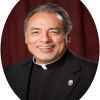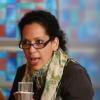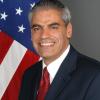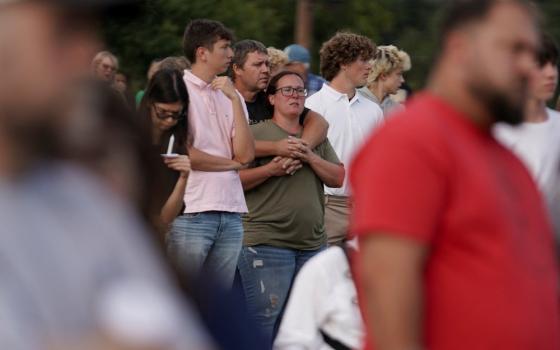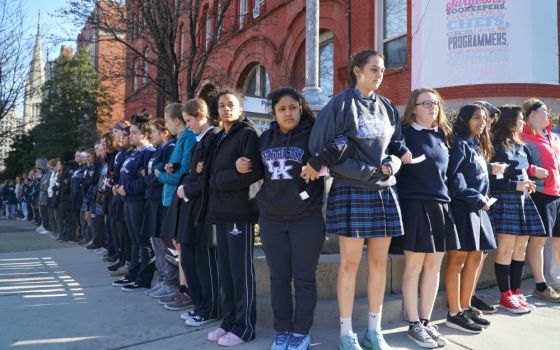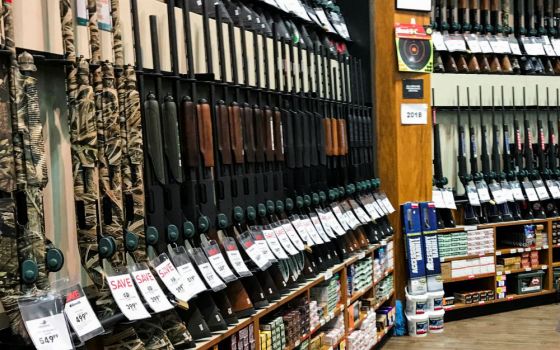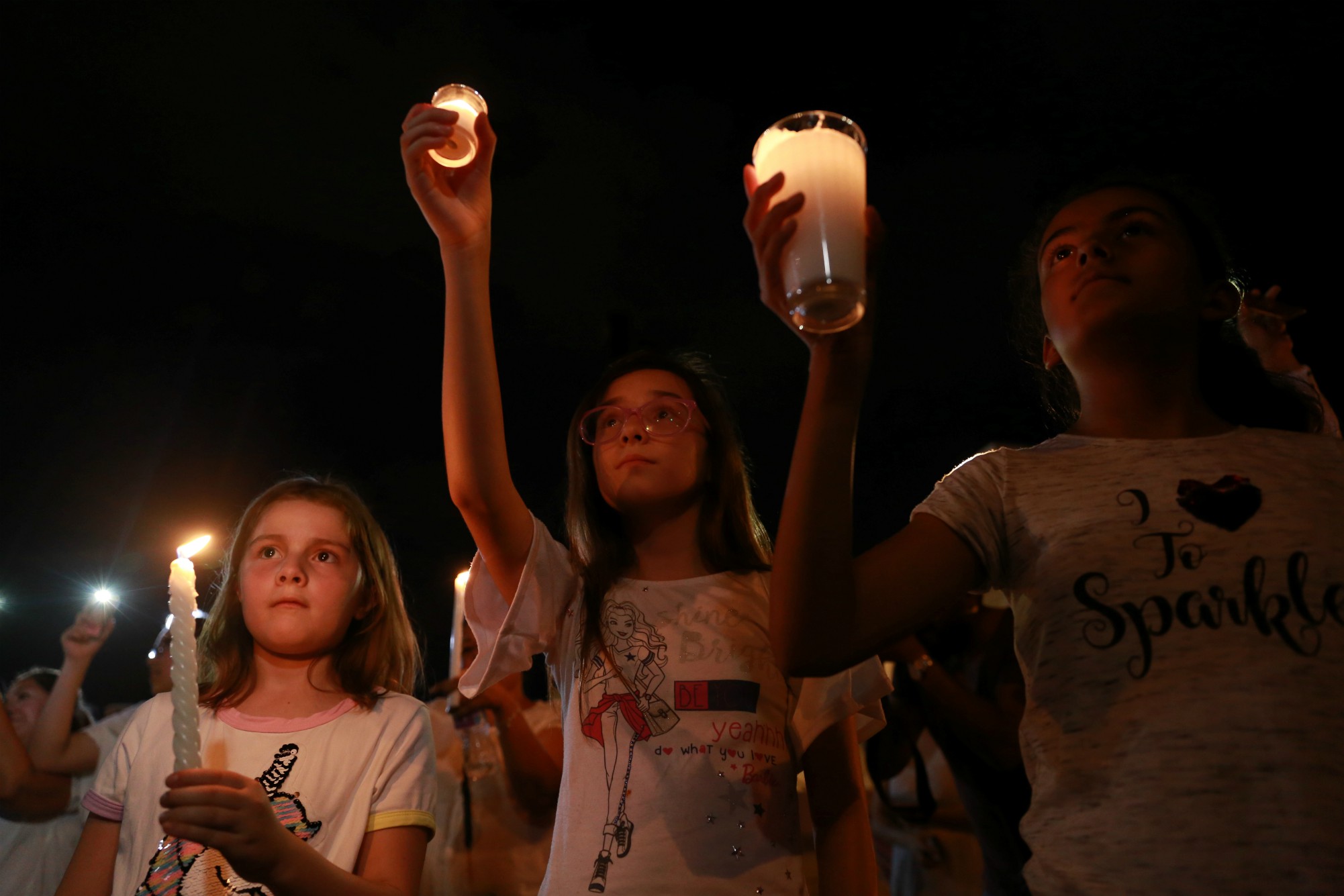
Mourners take part in a vigil near the border fence between Mexico and the U.S. after a mass shooting at a Walmart store in El Paso, Texas, August 3, 2019. (CNS photo/Reuters/Carlos Sanchez)
We are a slice of the diversity that is Latinidad in the USA. We live in binational lands marked by shifting and arbitrary walls, places where borders cannot easily divide sister cities like El Paso USA y Ciudad Juárez México. We reside in cities, on coasts and in the heartland, where our large Hispanic presence is viewed as a minority, though the demographics indicate we are more of a majority than most care to admit. We are at home in diasporic spaces where the migrations of our families have brought us. We are lay and clergy, parents, tíos y tías, and the children and grandchildren of elders whose Spanish-speaking tongues were too often silenced. Our theologizing is grounded en lo cotidiano, in the daily rhythms and ruptures of life, in the in-betweeness, in motion, on hyphens, @ (at) all sorts of spaces that shape our complex perspectives.
We write as the authors of Theology en la Plaza — en conjunto, united in prophetic rage and graced by the resilience of nuestra gente. We write because we can and because we must. As preachers and teachers and theologians, words are our business and so we pay critical attention to the role of the incendiary language that fueled the latest destructive incarnation of hate at a Walmart in El Paso, Texas. Words, tweets and rhetoric really matter. Words can be used to construct liberating human experiences or to oppress our neighbors. As the old saying goes, "actions speak louder than words."
When the President of the United States singles out Latin American immigrants as rapists, criminals, invaders and animals, when he describes the places that certain-mostly black and brown-human beings live as "shitholes," "disgusting," and "rat and rodent infested," he cultivates a racist culture of fear and violence. When the administration flexes its muscle to separate immigrant families and cage vulnerable children, such actions do not make America great in any way. Rather, they inflict great trauma on innocent lives and diminish our leadership and moral credibility worldwide. When our elected president singles out African American, Muslim and Latina politicians and urges they be "sent back," and when he revels in derisive chants and laughs at threats of gun violence during his rallies, his calls for unity ring hollow. When media like Fox News amplify the hate with misinformation and inflammatory racist and xenophobic commentary, they fuel a "destructive propaganda machine" that has deadly consequences: our loved ones die.
Advertisement
In the desire for national unity, too many retreat into false moral equivalences—a posture most evident in the president's insistence that in Charlottesville there were good people on both sides. A faith that radically declares the centrality of the cross, positioning itself in solidarity with the crucified Christ, and with all crucified peoples, must recognize the inherent lie present in "both sides" rhetoric and policy making. All Christians must be moved to call out this lie. Christians must stand decisively with and for the victims, regardless of their nations of origin, ethnicity, gender, sexual orientation or religious creed.
In the face of hate, Christians cannot stake out a "neutral center." Media commentators, pundits and many career politicians try to address the divisive ethos that dominates public discourse with calls for a moderate centrist position. This sense that there is a "middle ground" has also made its way into Christian communities across the nation. This proposition is a falsehood, and contrary to Christian values. There must be no "middle ground" when it comes to hatred. Vindictive policies and political rhetoric have advanced too far toward exclusion and the dehumanization of specific groups of people. For over a year the government has sponsored what is in effect the abuse of children at the border, verbally, emotionally, physically and in some cases sexually. Cut off from their parents, too many children are indefinitely detained or moved into the foster care system simply because of an urge to deny and punish migrant and refugee families. Such practices represent an absolute capitulation to cruelty, and this is absolutely not Christian.
A nation that was unable to pass reasonable gun control legislation after a shooter killed 26 children and their teachers in Newtown, Connecticut, seven years ago once again seems bound to seek tepid, middle-ground solutions after one of the bloodiest weekends in recent U.S. history. In these cases of unmitigated violence there must be no neutral or centrist posture. The insistent refrain of Ohioans to their governor in the aftermath of the Dayton tragedy should resonate with us all: "Do something!"
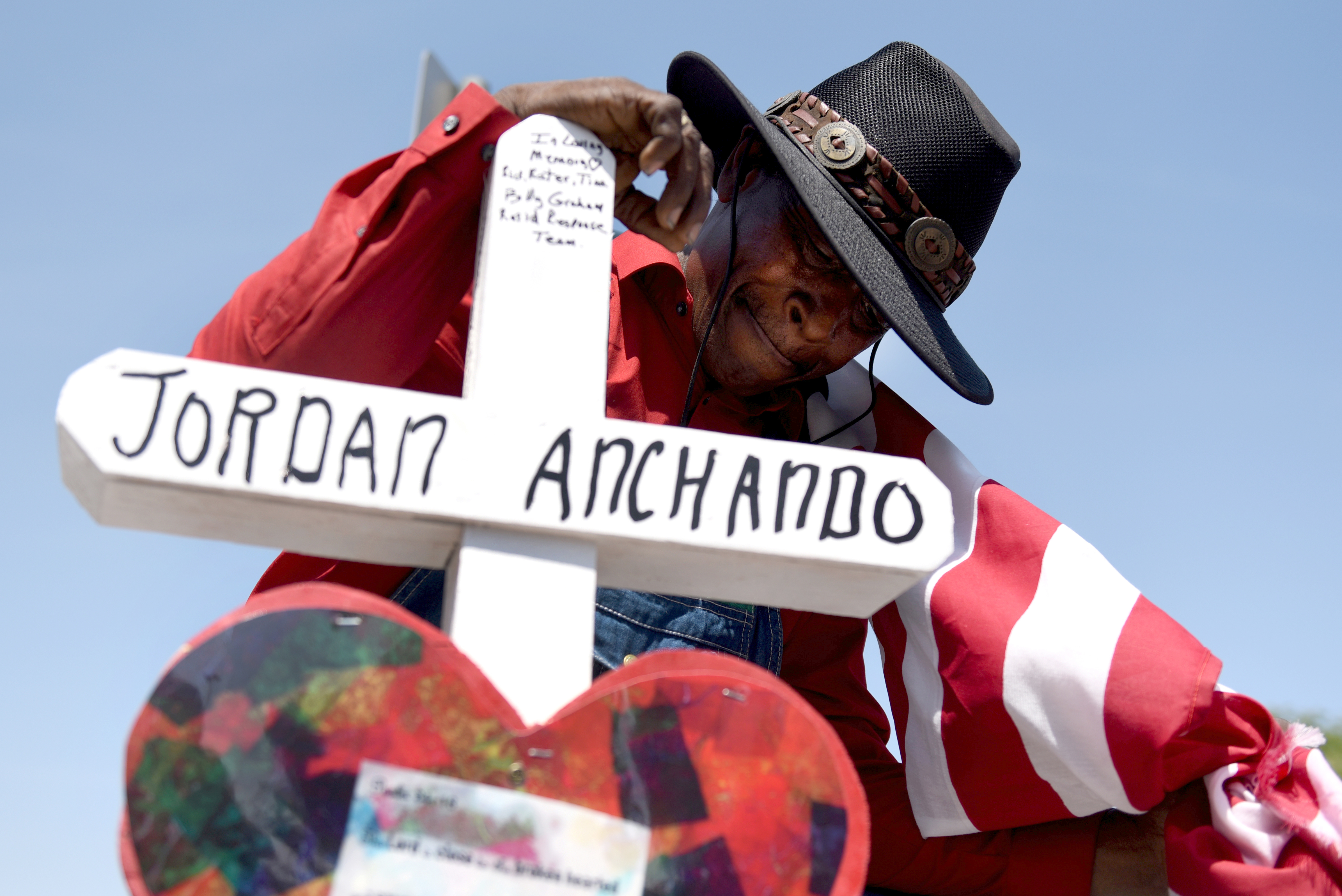
Curtis Reliford kneels August 5, 2019, next to a cross in honor of Jordan Anchando, one of the victims of a mass shooting August 3 at a Walmart store in El Paso, Texas. Since 1996 cross builder Greg Zanis of Aurora, Illinois, has delivered free of charge more than 26,000 wooden memorials at the site of mass murders and other tragedies across the U.S. (CNS photo/Reuters/Callaghan O'Hare)
What was striking about so many responses to the El Paso massacre was the failure to point out that these victims were targeted precisely because of their Latin@ identity. While racism and even white nationalism were acknowledged as motivating forces, the identity of those targeted for extermination remained collectively unspoken, from president Trump through any number of political and church statements. A manifesto, by the alleged killer, eerily echoed words and phrases from the all too familiar tweets and rally cries of the President. These words have been allowed to fester uncontested, hardening hearts and poisoning minds.
El Paso was selected because of its location as a crossroad of Mexican and Mexican American life. Why a Walmart? After allegedly casing the store, the killer determined the clientele was sufficiently Hispanic and Mexican for his evil purpose. The intent was clear: it was an attack on Mexicans regardless of nationality, citizenship or status. The outcome profoundly disturbed the peace of a city statistically recognized to be among the safest places in the country, and of a people who have spent much of the past year resisting hateful practices and policies by offering sanctuary and hospitality. El Paso has its own manifesto: one lived in family, love and justice as a contemporary Ellis Island.
When you, your family, tu gente and the people you accompany are targets, you don't have the luxury of clicking past the news or the time to "have no words." The ongoing verbal assaults on Hispanics, immigrants, refugees, African Americans, Jews, Muslims, LGBTQ+ and others deemed unworthy is violence with the inevitability of escalation. Hate is the infection. It threatens the minds and hearts of our young, inflicts terror through violence and invades our public spaces — our schools, concerts, malls, houses of worship. This hate needs no dark web to proliferate. It has plenty of breathing room on the social media staples of our daily lives — Facebook, Twitter, Instagram — and implicit sanction from "credible" authorities.
White nationalistic and racist xenophobic ideologies are at odds with our Catholic teaching — there is no middle ground.
So now what? ¿Y que? What are we to do as the blood of our kin cries out for justice and a better day? Calls for unity are empty when those who are responsible for manuring the ground that nourishes hate and raises violence refuse to accept responsibility for their words and actions. Elected officials: Do your jobs! Set aside partisan ideologies and political gain, and call each other to task. Politicians who have sold your souls to the NRA or who hide in silence as human rights are violated: You are complicit as enablers. Church leaders: speak up, speak out, teach, preach! White nationalistic and racist xenophobic ideologies are at odds with our Catholic teaching — there is no middle ground. There are no illegal human beings. Disrespecting human dignity in words, practice and policy calls for acts of resistant consciences and, when necessary, civil disobedience. Christians who claim to have Jesus in their hearts and the Gospel on their lips, yet who remain silent about racism are hypocrites.
Love of neighbor should cause us to see our vulnerable selves in each other and to act accordingly with mercy and justice. Love of our enemies demands that we hold accountable all those who debase themselves by their ill treatment of others. Some people think, "this doesn't impact me," and so they choose indifference. Guess again! In times fueled by hate, we are all potential victims. If for no other reason than self-preservation, choose solidarity!
As Latin@s we feel all too well the target that has been placed on the backs of our Hispanic and immigrant communities. Our hearts are bound to our hermanos y hermanas in El Paso who are suffering, wounded, crushed and devastated right now. La sangre spilled by our dead and wounded must move us, in the words of Pope Francis, to make noise, "to raise a ruckus!" ¡Hagan lío! The blood of our loved ones who were killed and wounded must embolden us to active resistance against racism, exploitation and hate, and to prayer and critical reflection on who we are and what we must become as a nation.
The blood of our kin cries out to God from the ground:
Andre Pablo Anchondo, 23
Jordan Anchondo, 24
Arturo Benavidez, 60
Leonard Cipeda Campos, 41
Maribel Campos (Loya), 56
Maria Flores, 77
Raul Flores, 77
Jorge Calvillo Garcia, 61, of Torreón
Adolfo Cerros Hernández, 68, of Aguascalientes
Alexander Gerhard Hoffman, 66
David Alvah Johnson, 63
Luis Alfonzo Juarez, 90
Maria Eugenia Legarrega Rothe, 58, of Chihuahua
Ivan Hilierto Manzano, 46, of Juárez
Elsa Libera Marquez, 57, of Yepomera
Gloria Irma Marquez, 61, of Juárez
Margie Reckard, 63
Sarah Esther Regaldo Moriel, 66, of Ciudad Juárez
Javier Amir Rodriguez, 15
Teresa Sanchez, 82
Angelina Silva Englisbee, 86
Juan de Dios Velázquez Chairez, 77
And those victims lost in the shadows because of fear of deportation.
¡Presente!
[Msgr. Arturo J. Bañuelas is currently the pastor of St. Mark's Parish in the diocese of El Paso, Texas. MT Dávila is Associate Professor of the Practice, Religious and Theological Studies, Merrimack College. Miguel H. Díaz is the John Courtney Murray University Chair in Public Service at Loyola University in Chicago. Carmen M. Nanko-Fernández is professor of Hispanic theology and ministry, and director of the Hispanic Theology and Ministry Program at Catholic Theological Union (CTU) in Chicago.]
Editor's note: We can send you an email alert every time Theology en la Plaza is posted to NCRonline.org. Sign up here.
